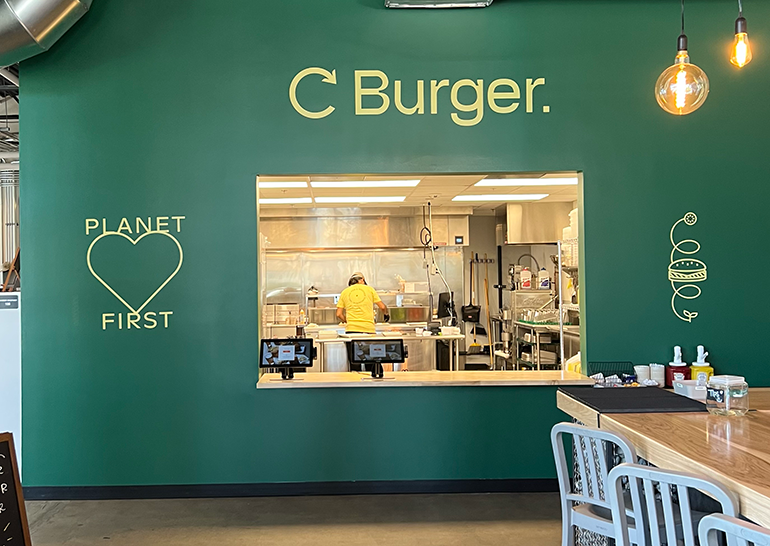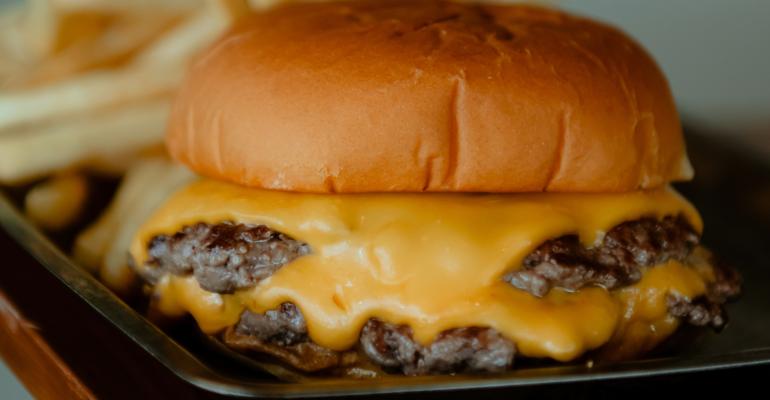Not everyone can afford to eat at Bryan Dayton's upscale Boulder restaurants Corrida and Oak at Fourteenth, but the restaurateur wants to showcase his love for regenerative beef with a new, affordable concept. Enter C Burger, which opened inside a brewery in the Denver suburb of Englewood, Colo., at the end of June.
"Everyone likes burgers and I thought that we could figure out how to make a regenerative burger," said Dayton over the phone. "There are people playing with natural and decent beef outlets, but no one is really doing regenerative beef."
The idea of regenerative beef goes beyond other categories such as organic, natural, or grass-fed. It focuses on soil conservation and grazing cattle in such a way that they stimulate the growth of grass, resulting in deeper roots that help preserve topsoil while sequestering carbon. If done correctly, proponents of this type of intensive grazing say it results in more carbon being returned to the soil than is released in the air.
Dayton said it also results in more flavorful and more nutritious beef.

CBurger facade inside the brewery.
The C Burger concept started with Corrida, Dayton’s five-year-old restaurant in Boulder, Colo., focused on the food of Northern Spain. There chef and partner Samuel McCandless finds ways to use every cut of the beef that he sources from local ranches. For the leftover ground beef, he conceived of the burger restaurant.
"We are trying to do something good for Mother Earth, but at the end of the day I don't want to discourage someone from coming to the restaurant," Dayton said. "It's not a fancy hipster, ‘save the Earth’ burger. It's a good burger, it's a good product, it's Colorado [based] and everyone can get behind it."
Whether or not customers buy it for the cause or just because it tastes great, it's a win in his book.
"It's very important not to alienate anyone over values or whatnot,” Dayton said. “I want everyone to come in, and if they want to peel back the layers that's cool. Whether you're buying it just because it tastes great or because of the cause, it's a win-win."
All burgers come with two thin patties starting at $8 for a classic hamburger, $10 for a cheeseburger and $12 for the ColoRADo burger with American cheese, bacon and fried jalapeño peppers. Diners can also order a portobello mushroom cheeseburger for $8.50 and fries for $5.
Dayton said the prices don’t truly reflect the ingredient costs; they should be charging more. But the company wants to remain competitive in the quick-service burger market in order to grow. Dayton and his team are working to offset the overhead with other products. Opening the first location inside Sanitas Brewing Company in Englewood also minimized startup costs.
As the group figures out this first C Burger, he said, they will collect data and go from there. The overall goal is to offer good meat to anyone who wants it.
Eventually, Dayton hopes the business grows enough that they can expand into Wyoming and Montana and use ranches there. Dayton has plans to expand C Burger in 2024, both in the casual kiosk form like the first location, and into more standalone spots. Next on the docket, a C Burger in Boulder, Colo., as long as all goes according to plan.





